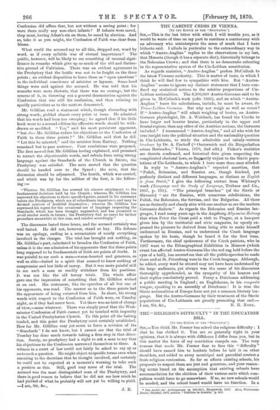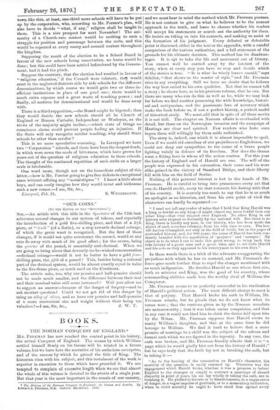THE " RELIGIOUS DIFFICULTY" IN THE EDUCATION BILL.
[TO THE EDITOR OF THE .` SPECTATOR."]
Sir,—You think Mr. Forster has solved the religious difficulty ; that he has shirked it. You are so generally right in your opinions, that it is always with diffidence I differ from you, but in this matter the force of my conviction compels me. The very reasons that made Mr. Forster fear to face this " difficulty" should have caused him to hesitate before he laid it on other shoulders, and added to every municipal and parochial contest a fresh religious contention. So far as affects existing schools, his proposals to respect them are just and generous, and your reason- ing seems based on the assumption that existing schools have accommodation for the children of their various sects which com- pulsion would force to go somewhere. If so, no new schools would be needed, and the school board would have no function. In a • See Archio fiir Anthropologic (p. 2013-217), Brunswick, 1867. Also, Weelminater Reriew, October, 1867, article, " Dualism in Austria," p. 413.
town like this, at least, one-third more schools will have to be put up by the corporation, who, according to Mr. Forster's plan, will also have to decide " what, if any," religion shall be taught in them. This is a nice prospect for next November! The ani- mosity of a Church-rate contest would be nothing to such a struggle for position and patronage between the sects, and this would be repeated at every vestry and council contest throughout the kingdom. Supposing the result of the election to be a School Board in favour of the new schools being unsectarian, no harm would be done; but this could have been settled beforehand by the Govern- ment, had it had the pluck.
Suppose the contrary, that the election had resulted in favour of " religious education," if the Council were tolerant, they would erect in the neglected districts side by side schools for the different denominations, by which course we would gain two or three in- efficient institutions in place of one good one ; there would be much extra expense and a great waste of teaching power ; and finally, all motives for denominational zeal would be done away with.
There is a third supposition,—the Board might be bigoted ; then they would decide the new schools should all be Church of England or Roman Catholic, Independent or Wesleyan, as the views of the majority might incline,—which state of things no conscience clause could prevent people feeling an injustice. If the State will only recognize secular teaching, why should State schools be other than secular ?
This is no mere speculative reasoning. In Liverpool we have two " Corporation " schools, and there have been the deepest feuds, in which were sown the seeds of bitterness, which have grown for years out of the question of religious education in those schools. The thought of the continued repetition of such strife on a larger scale is intolerable.
One word more, though not on the immediate subject of this letter,—how is Mr. Forster going to give free tickets in exceptional cases without affixing any " social stigma "? I know a little about boys, and can easily imagine bow they would taunt and nickname such a new comer.—I am, Sir, &c., Liverpool, Feb. 21.
S. WELLINGTON.



































 Previous page
Previous page